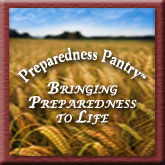
Safety Tips for Cooking with Kids
Combined from the California Department of Health & Penn State Cooperative Extension
One of the best ways to teach food safety is to practice it—and to be vocal about why it is being practiced. This needs to begin as soon as the child is aware of and is taking an interest in food (beyond throwing it!).
1. Prevent food poisoning by:
• always washing hands before cooking.
• not eating raw eggs or raw meats.
• waiting until the food is cooked before sampling it. Do not sample uncooked foods.
2. Have children stand at the level of the activity. Use a stool if necessary.
3. Use cooking supplies that will not break (such as plastic measuring cups and stainless-steel bowls).
4. Use plastic knives or butter knives for cutting.
5. Provide constant supervision.
• Always watch children when they use knives, mixers, or the stove.
• Supervise the use of ovens, stoves, and other kitchen appliances.
• Remind children that stoves, ovens, pans, and dishes can be very hot.
Why you should LOVE cooking with your kids-it's learning in disguise!
From the Penn State Cooperative Extension
Most children learn quickly that eating is fun. They also enjoy helping adults cook. Put the two together and you have the perfect recipe for learning. Children learn best when they’re busy and interested in what they are doing.
When children are busy scrubbing, mixing, stirring, kneading, spreading, tossing, squeezing, and pouring, they don’t realize there’s a special ingredient that you’re adding: It’s called learning!
• Cooking involves reading and talking. There is much to talk about as a recipe is read, followed, and prepared.
• Children learn math skills through counting, measuring, and following step-by-step directions.
• Science is learned as children see how food changes during cooking. They learn about hot and cold, floating and sinking, dissolving, melting, and freezing.
• Good nutrition is encouraged through cooking. Seeing exactly what goes into a recipe helps children learn to make better decisions about the food they eat.
• Children can learn about and connect with other cultures as they prepare foods from various cultural groups.
• Thinking skills are developed as children learn to compare and make relationships in food preparation. If we use too much flour in our cookie recipe, the result is a dry, hard cookie. Proportions are easily mastered when children learn that if you double the ingredients in the cookie recipe, you get double the cookies.
• Social skills are practiced in cooking when children work together, take turns, and solve problems. Most importantly, self-esteem abounds when children prepare foods for themselves and others.
SO GET OUT THERE AND COOK WITH YOUR KIDS!!!!!!!!!!!!!!!



























2 comments:
My oldest is only three, and she loves to help me in the kitchen! If she sees me cooking, she'll run and grab my apron and her little apron, and tell me to put my apron on. She loves to help stir and pour. I'm so excited for cooking with her as she grows, I want her to enjoy being in the kitchen as much as I do!
My 3 & 4 year old boys love cooking with me, we have two sturdy wooden stepstools from IKEA, one apron, and one chef costume-- they stand with me and help everyday!
Great post!
Post a Comment